A Comprehensive Guide to Healthcare App Development in 2023: Cost & Know-how
Contents
Healthcare app development recently became an inevitable operation for people to e-check their health problems via statistics, numbers and analysis. From that, in some cases, there is no need for patients to directly go to hospital and meet doctors for help.
This also shows the importance of building a healthcare app with a mission to bring real-time health insights to the users.
What is a Healthcare App?
Digital healthcare app development is a process of developing applications for mobile devices to help patients, doctors, nurses, or even users who care about their health, track health status in a more efficient and convenient way with just a few clicks.
Some popular healthcare app services include: general diagnosis, in-deep consultancy, professional remote treatment..
With various purposes and performances to improve healthcare, there are many types of applications for its users to experience and utilize features. Each digital healthcare app has its own functionalities and appropriations for different users so in the next step, we will figure out some differentiations between them.
What is the Difference Between a Health App and a Medical App?
The disparity between health apps and medical apps is the main functionality of these apps.
While health apps focus on providing health-related services to users, medical apps are mainly used to provide general health information and issues diagnosis for its users.
| Criteria | Health App | Medical App |
| Users | for people in general | for professional and patient in medical |
| Goal | Focus on providing health-related services and e-prescription | Mainly used to diagnose health issues via data analysis |
| Cost | Cost less to develop | Cost more to build and maintain |
| Main functionality | Provide health-related services or health guideline for general users | Provide electronic health record and health-related information for patient |
Healthcare programs help patients access medical services instantly and remotely, making them feel more comfortable and time-saving without going to hospital.
Meanwhile, medical software allows users to get health diagnosis and supports medical experts in storing data, accessing patient conditions and sharing the idea to other experts.
Even though there are certain disparities between healthcare and medical programs, both of them provide qualified services for patients.
All of the statements above help us to clarify the difference between these two types of apps. For the next part, let’s figure out how much we have to spend on developing a healthcare software.
How Much Does It Cost to Develop a Healthcare App?
The total cost to fully build a mobile healthcare depends mostly on the complication and features of that software. For example, a simple healthcare app can amount at least 50,000 – 80,000 USD. Moreover, the healthcare app development cost will be around 100,000 USD if it is a complex software or launched on IOS platforms.
Before diving deep into the cost for specific features, let’s have a look at fundamental healthcare app features:
- Registration and login process
- User account / profile
- Administration panel
- Search engine
- Notifications
- Payment method
- Supporting system
Furthermore, the hours taken also decides the healthcare app development cost:
| Feature | Hour estimation |
| Profile | 60 |
| Documentation | 80 |
| UI/UX | 240 |
| Coding (Frontend + Backend) | 560 |
| Testing | 160 |
| Compliance Audit | 40 |
| Total time | 1140 |
There are 3 popular types of digital health app development services that managers can consider:
- In-house team
- Freelancer
- Outsourcing vendor
To be specific, having an in-house team will provide a qualified process of building a healthcare software but you may have to pay an exorbitant price.
While hiring freelancers could be a money-saving solution, the quality in the long-term process could not be totally guaranteed.
Outsourcing vendor can be an appropriate option when this type of service can meet all the crucial demands to fully build a healthcare app.
However, it’s worth noting that the price of outsourcing healthcare app developers is mostly decided by the location. For instance, South Asia is considered to have the lowest hourly rate with the average price to develop healthcare apps is around $9 – $15 per hour.
Companies in Eastern Europe and USA can pay developers around $70 – $200 per hour and $80-$250 is a cost to be paid for developers in the US
The average cost of a healthcare app is around $60.000 – $80.000 in India and Ukraine (source). Additionally, a healthcare software will cost at least $200.000 approximately in Eastern Europe and USA without considering post-launch maintenance and promotion.
Learn more about Mobile App Development Costs
How to Develop a Healthcare App?
Healthcare mobile app development process requires making ideas, sorting out the target customer, and working consistently, to name a few.
Here are some fundamental steps that need focusing when building a healthcare app.
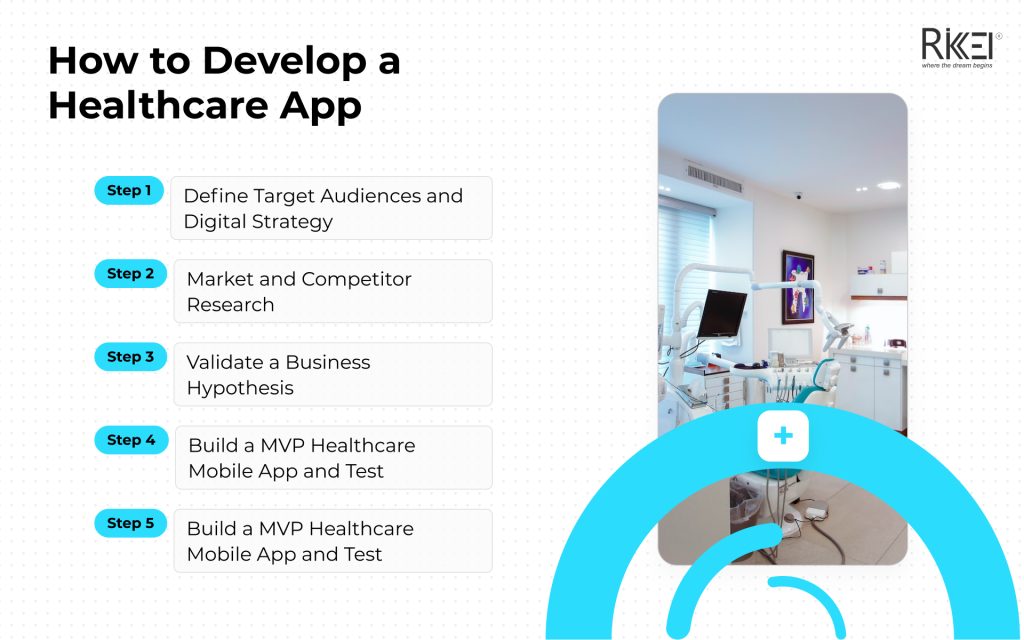
Step #1: Define Target Audiences and Digital Strategy
Getting to know the main target audiences is the deep-rooted need of building any application. First of all, it is important to clarify the demographics such as: age, gender, location, income, educational background, occupation, etc of ideal audiences.
Understanding the demographics is just a general way to identify ideal customers. From that, app developers could figure out some personalities of target audience by asking questions such as:
- What are their characteristics?
- In which channel can we find them?
- What services do they need in a healthcare app?
- Do they get used to healthcare apps or the traditional medical examination?
- What factors that highly affect them to make a certain decision?
By answering these personal questions, we will find the connection in lifestyle and insights from them for the next move.
All of the steps above are not enough if we do not double-check the analytics and evaluate the decision. It is always possible that people frequently using your health care app might not be the people you had in mind as your target audience.
The best way to make sure that they are your target group is to look at analytics and carry out the evaluations. Both Google and Facebook analytics have a vast amount of data about audiences visiting websites and engaging with social media respectively.
Utilizing the data from your healthcare website via Google Analytics helps developers a lot in tracking the specific visitors persona. Moreover, Facebook or other social channels could be a second choice that deeply evaluates the characteristics of target audiences via Meta Business Suite.
Step #2: Market and Competitor Research
Market research helps healthcare software builders know more about general market status out there. Competitive analysis helps them understand the abilities and backdraws of competitors. By combining them, healthcare app developers can find competitive strengths to build the app upon.
Developers can use existing sources or do their own research directly asking their consumers. However, available sources can save much of your time and work, but the results might not be as specific as you wished.
When it comes to direct research, it can be time-consuming and quite expensive. Nonetheless, the information can give researchers a better understanding of the market and specific audiences.
Here are some ways to conduct direct research for better results:
- Surveys
- Questionnaires
- Focus groups
- In-depth interviews
- Landing pages
Beside having direct research, healthcare app developers need to know who they are competing with, then you can define what kind of competitive factors gain sustainable revenue.
A competitive analysis should clarify the competitions via product service and market segment. Let’s evaluate some crucial characteristics of competitive landscape:
- Market share
- Strengths and weaknesses
- Opportunities that help you gain the market share
- The importance of your target market to your competitors
- Barriers that hindering you from entering the market
- Indirect or secondary competitors who may impact your app success
The more you research your market and competitors, the more successful your healthcare app may be. The truth is many companies fail by spending too much time and money expanding the business without having in-depth market research and understanding their competitor.
Step #3: Validate a Business Hypothesis
Digital health app development is not an easy process because it can pose risks at any time. Therefore, building and validating business hypotheses can significantly reduce those risks and prevent builders from wasting valuable sources such as time and money.
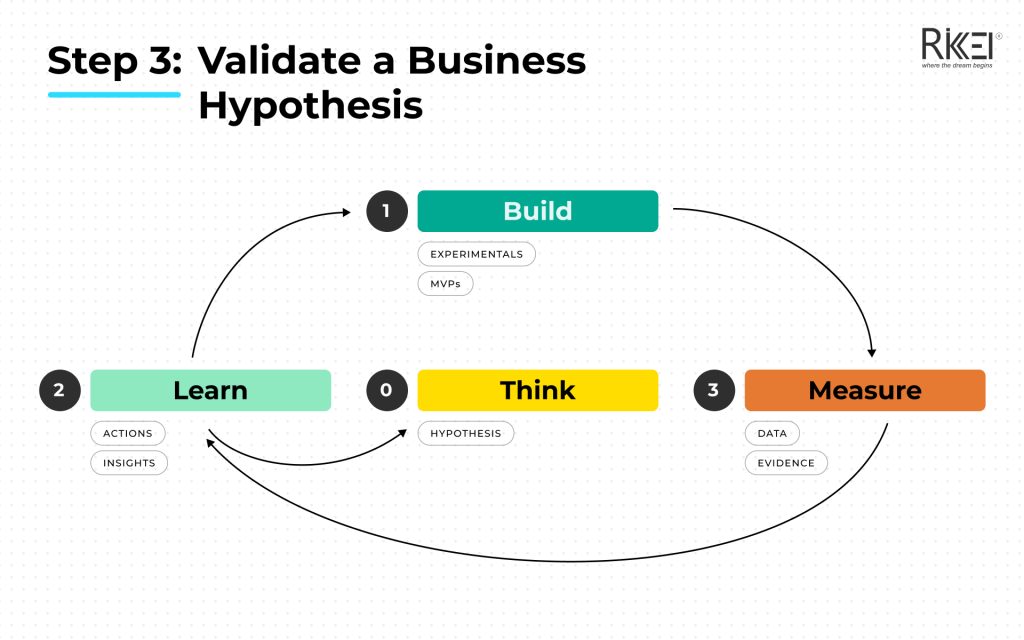
By thoroughly validating product hypotheses, developers can greatly affect the future results of the digital healthcare app. So, here are some hypothesis that medical business owners can consider:
- Users’ level of knowledge
- Users’ technique skills to familiarize with your healthcare app
- Help user to get familiar with your healthcare app
- Users’ expectations about the general experience in your app
- How you can respond to users’ needs
- Product security and transparency
- Medical market demands
- Specific usabilities that audiences need from your app
- What kind of instructions help users easily get used to healthcare app (images, animation or text…)
Step #4: Build a MVP Healthcare Mobile App and Test
MVP stands for Minimum Viable Product which means that developers should build enough core data, sources and features to basically create an m-health application with fundamental functions.
From that, with the equipment of healthcare mobile app MVP, users can have a basic experience and services. A healthcare mobile app MVP is a core product that fully functions for primary purposes only.
For example, an MVP development of a heart issue-related digital app might has some crucial features as:
- General heart disease diagnose
- Find cardiovascular professionals.
- Book a meeting with doctors.
- Get e-prescription
- Find medicine vendors
- Specific issue reports
- Ambulance access
Moreover, an MVP for a general healthcare app needs some crucial features such as:
- Geolocation
- HIPAA Compliant Messaging
- Cloud Storage
- Appointment/medicine notification
- Health monitoring
- Calendar and Scheduling
- User Education system
Therefore, without the background development or MVP of a healthcare mobile app, developers can not provide crucial functions and other good services to users.
Step #5: Build a Product That is Outcome-focused
Outcome-focused features can be a unique selling point for your healthcare mobile app. These features could be having a friendly interface, minimal user experience and a clear table of contents for each medical blog, etc.
Instead of working on random stuff, each of the details and features on your medical mobile app should be aligned with the purpose that you want to impact.
Step #6: Find a Vendor With Experiences in Healthcare
After all, a healthcare app needs a medical net working with hospitals and doctors. Finding an experienced healthcare vendor is not easy as it depends on areas that the healthcare app develops and the vendors’ connection with qualified physicians.
Moreover, a completed healthcare app needs a good healthcare development vendor to maintain the process. Rikkeisoft is an example when they are a top-class software company with diversified majors and have a cost-efficient custom software development solution that stays & scales with your healthcare business.
How to Choose the Right Technology Partner to Develop a Custom Healthcare App?
Healthcare app development companies are present in every market and corner today. However, not all of these technology partners meet the standard criteria to fully build a digital healthcare app.
- Abundant human resources
Firstly, a technology company that has accessibility with great talents is preferred. The demand for healthcare software developers is much higher than the supply. Therefore, the manager needs to find a company which has qualified developer resources to ensure the building process.
The good thing when working with outsource agencies is that they take care of all the technical problems in the process for you. The healthcare app development firm is responsible for building a team, finding talent, creating motivation and making the process of teamwork more efficient.
- Experienced in healthcare
Moreover, finding a technical experience vendor is not easy also. Make sure that their previous experience and projects ensure they can manage and propose appropriate technologies to build your healthcare app successfully and avoid potential issues further down the road.
- Trustworthy testimonials
After that, reviews and comments from some prestige platforms such as: Clutch, Goodfirm, Trustpilot… can indirectly double-check the reputation and collaboration of that technology firm. From these platforms, managers can sort out better requirements that they need from the company in order to save time and work in finding a qualified technology firm.
Rikkeisoft is a bright option when including all of the requirements above. With outsourcing services, innovation technology, digital-related services and 10+ years of services, Rikkeisoft is proud to have diversified and qualified sources to make your healthcare mobile app development successful.
Healthcare App Development Requirement Checklist
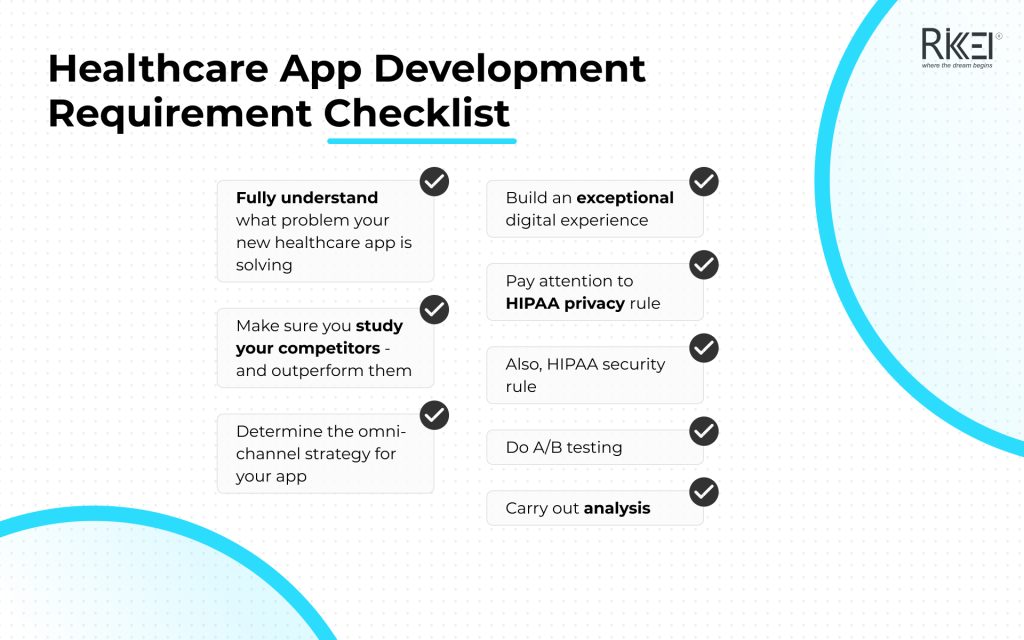
1. Fully understand what problem your new healthcare app is solving
Developers need to make sure that their healthcare mobile app is built to solve certain problems that users require.
Some of these problems can be listed as: accessing medical records, booking an e-meeting with medical experts, getting an e-prescription after diagnosis, etc.
Having a clear goal and mission at the beginning stage helps the healthcare app development team understand what they are working for. Make sure that every feature that the team is creating will have specific functions and purposes.
2. Make sure you study your competitors – and outperform them
Learning from your competitors is a path to success. By having competitive research done right, the results could help builders have a clear look at what specific work that your competitors are doing.
With this information, developers will know their strengths and weaknesses in healthcare app features to improve. These valuable data could help you come up with a better solution for the problem that your competitor is struggling with.
3. Determine the omni-channel strategy for your app
Omni-channel has become a buzzword in the marketing by offering multiple benefits for builders. This can be also a great marketing strategy with advantages, include:
- Personalize services for patients
- Better experience across channel
- Generate higher revenue
With these benefits, we can get more positive impacts when providing seamless experience across channels to users. One of the most important things when applying omni-channel strategy is having a cross-team execution. Product and marketing teams need to remain a close connection to make sure that the healthcare app operation remains consistent across channels.
Furthermore, builders need to know how customers engage with your healthcare app in order to meet their demands. Fully understanding your customers behavior across channels helps you optimize the process according to their needs.
4. Build an exceptional digital experience
Building exceptional digital experience in a healthcare app is harder than it looks, but the results are amazing. It makes your customers feel more special in a personalized way. Every users’ interactions need to stick with the concept of individual value and shared needs.
Always surprise users with some specific features as they are often too used to the introduction and interface of a healthcare app. Making something special at the beginning and ending customer interaction with “thank you” are some easy ways to gain their satisfaction.
Nonetheless, exceptional digital experience from a healthcare app needs to be simple as possible to not cause friction or inconvenience to general users. Finally, always stay up-to-date with your users to understand their needs and wants in the fastest way.
5. Pay attention to HIPAA privacy rule
HIPPA stands for Health Insurance Portability and Accountability Act – which establishes national rules for securing personal medical records and other health-related information of patients.
This law provides standards to protect users’ healthcare data and privacy for developers to have authority of access. HIPAA also gives patients rights to edit their medical records and manage their privacy information.
6. Also, HIPAA security rule
The HIPAA security rule requires physicians to protect patient’s health records by using suitable administrative, technique safeguard to ensure the integrity and security of this data.
All covered entities need to manage their security risk, even those who utilize certified electronic health records (EHR). These entities must be instead of administrative, physical and technical rules to control compliance with the Security Rule and document every security compliance measure.
7. Do A/B testing
A/B testing allows the healthcare app development team to test out many versions with a mission to find the best way to achieve specific goals.
The idea of A/B testing is to create a vast amount of variations of user experience. After that, testers can measure the results to consider what version performs better and have a strategic software development plan to optimize it even further.
8. Carry out analysis
Measuring users’ behavior is an indispensable step that comes from analytics of mobile app. These analytics help healthcare software developers understand their customers’ behavior, find where they engage with and how to attract new users.
There are many tools available in the market for developers to make analytics with their healthcare app. The best decision for the developing process depends on the quality of the analyses that researchers made. Therefore, choosing out appropriate mobile app analytic tools helps developers save time and money to achieve goals.
Conclusion
Here is the step-by-step guide to building a healthcare app. While developing an app requires various sources and time, by having a strategic plan at the beginning, developers will save time and easily gain progress in the total software developing operation.
More From Blog

April 4, 2024
Big Data Performance: Maximize Your Business Value
In today’s data-driven world, organizations are constantly generating and collecting immense amounts of data to understand their customers more deeply. This data, often referred to as “big data,” holds immense potential for organizations to seek opportunities and overcome challenges. But accessing and analyzing big data isn’t enough to have proper strategies; organizations must pay attention to […]

April 4, 2024
How Real-Time Data Analysis Empowers Your Business
In today’s fast-paced business landscape, the ability to quickly make data-driven decisions has become a key differentiator for success. Real-time data analysis, the process of analyzing data as soon as it’s generated, has emerged as a powerful tool to empower business across industries. By leveraging real-time data analysis, organizations can gain timely and actionable insights, […]
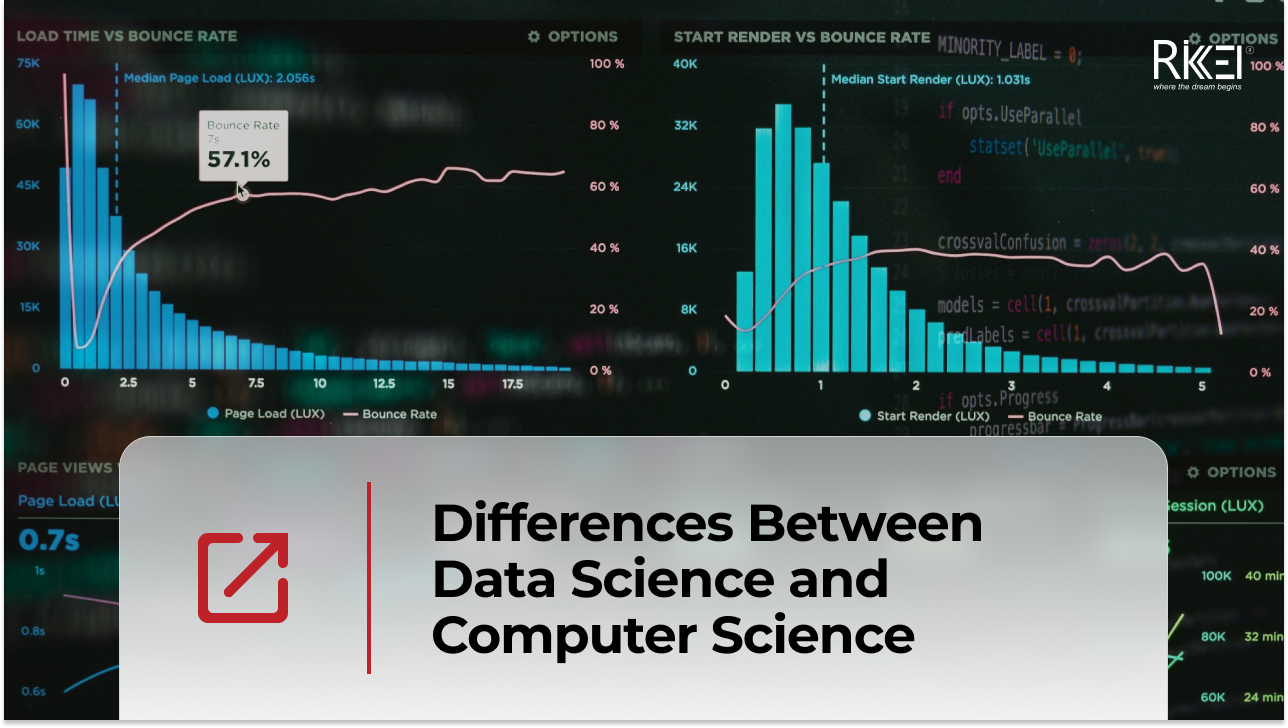
April 4, 2024
Differences Between Data Science and Computer Science
Data Science and Computer Science are distinct fields overlapping in certain areas but have different focuses and objectives. The article below will help you clearly understand the differences and the close connection between the two fields. What is Data Science? Data Science is an interdisciplinary field that combines scientific methods, processes, algorithms, and systems to […]

March 28, 2024
Introduction to Data Visualization and Key Considerations for Businesses
In your opinion, what is data visualization? Your main goal is to communicate your recommendations engagingly and effectively, right? To achieve this, let’s immediately explore a method that can represent information with images. What is Data Visualization? Define data visualization and their roles in organizations First, you need to find the answer to the question: […]
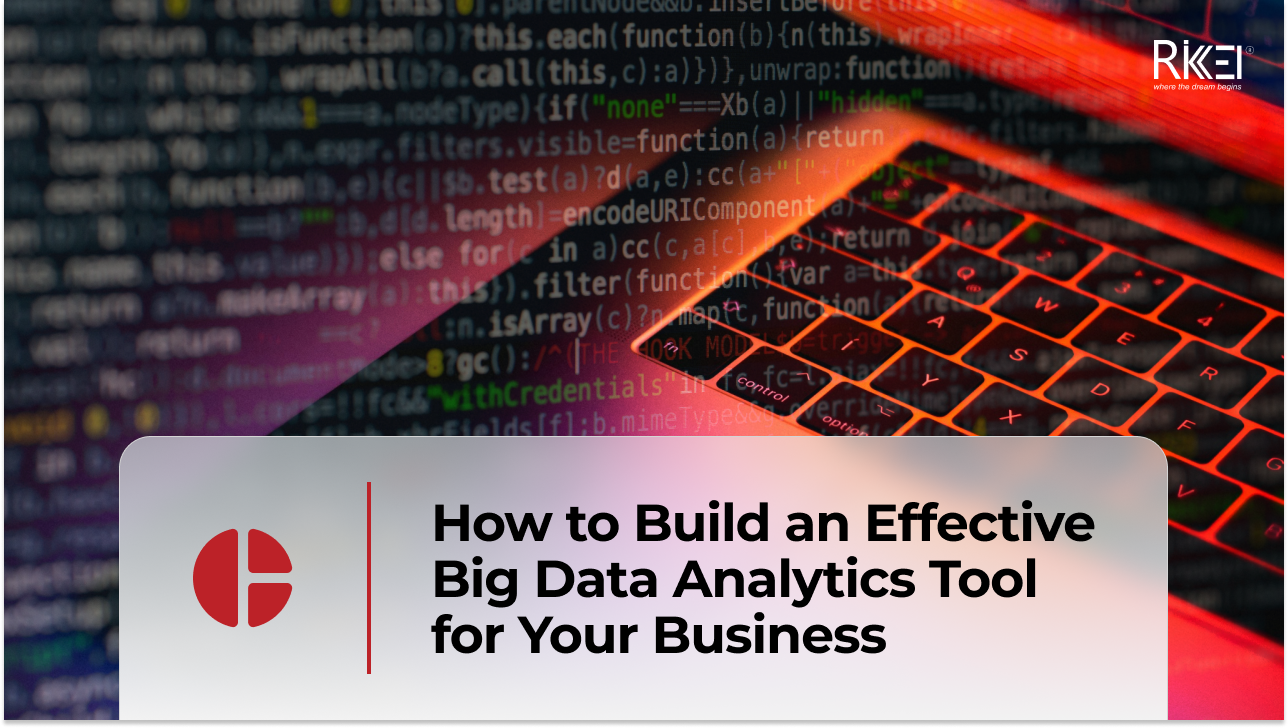
March 21, 2024
How to Build an Effective Big Data Analytics Tool for Your Business
Building an analytics tool for a business brings several significant benefits, especially in today’s business environment where data is becoming larger and more complex. So how to build an effective analysis tool for businesses, follow the article below! Assessing Business Needs Assessing business needs involves understanding the requirements, goals, and challenges of a business or […]

March 14, 2024
What Is Oracle Business Intelligence? Their Role in Today’s Enterprises
Oracle Business Intelligence (BI) refers to a suite of tools, technologies, and applications designed to help organizations collect, analyze and present business data. The primary goal of Oracle BI is to provide actionable insights to support decision-making within an organization. Oracle BI encompasses a range of products that enable users to gather, process and visualize […]

